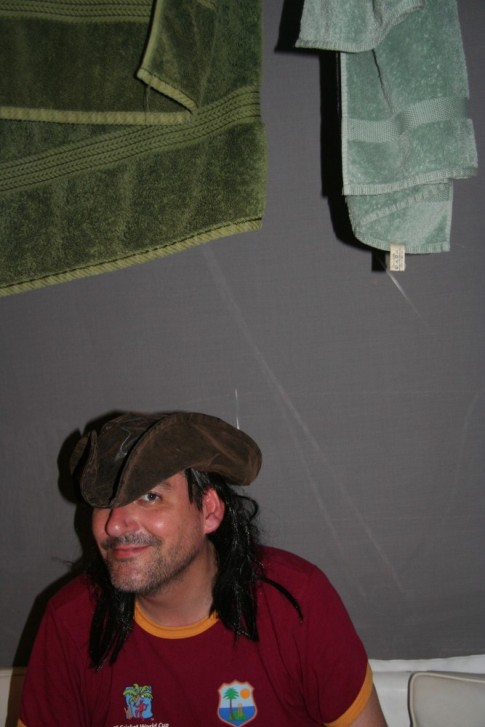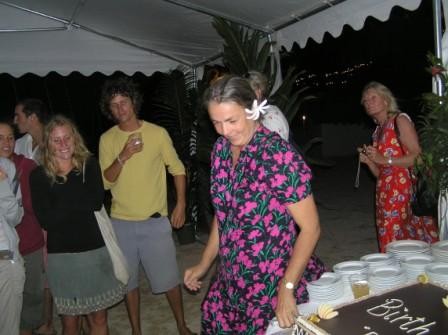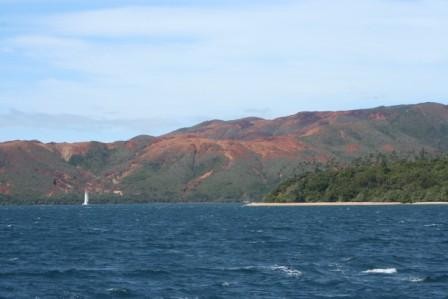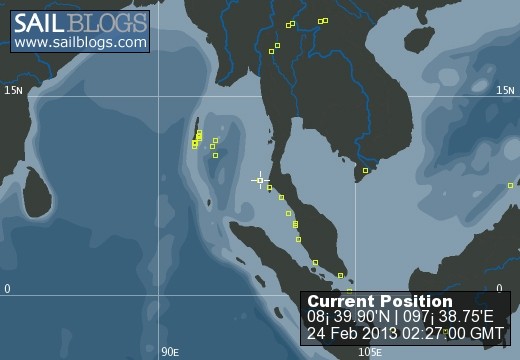
Around the World
23 February 2013 | Similan Islands Thailand
21 February 2013 | Bay of Bengal
15 February 2013 | Cinque Islands
15 February 2013 | Henry Lawrence Island
12 February 2013 | North Button Island
10 February 2013 | Henry Lawrence Island
09 February 2013 | Havelock Island
06 February 2013 | Neil Island
04 February 2013 | Rutland Island
01 February 2013 | Andaman Sea
30 January 2013 | Port Blair
26 January 2013 | Andaman Sea
26 January 2013 | Andaman Sea
03 December 2012 | Burma
02 December 2012
08 November 2012
08 November 2012 | Thailand
08 November 2012
10 June 2012 | Rebak Marina Langkawi
06 February 2012 | Malaysia
Romance of the Spice Island
12 August 2011 | Banda
michael and jackie

Lady Kay is currently anchored in Banda. Our stern is tied to a 16th century cannon on shore, with our anchor holding us off the shore.
We've been here in Banda for over a week now enjoying the beautiful scenery and the benevolent climate. We would have chosen to spend this long here but our decision was also influenced by Jackie getting the nasty Darwin flu that Michael had on leaving Australia
Banda has enticed many people in addition to the original Bandanese. First the Chinese, still here happily trading, then the Portuguese, the Dutch and the British all fought over this small piece of paradise. Banda is in fact a collection of tiny islands, all that remain of an immense volcanic cone. The central cone stands up perfectly shaped and has had some recent larva flows. It puffs smoke from time to time, but that last real eruption was 30 odd years ago. Surrounding the central cone are a collection of thin, curved, steep edged islands formed from the surrounding caldera. The islands are separated by narrow, deep stretches of water, with narrow coral fringes. The fertile volcanic soil and the ambient climate are an ideal growing environment for the native nutmeg, cloves and cinnamon which grow under the shade of the canopy of the vast 'almond' trees. (the nuts are delicious and taste like almonds, but are no relative to our almonds) The Dutch were so taken with the place they wiped out the original inhabitants for trading with the British. Nutmeg became an amazingly valuable commodity, in part because of its supposed protection against Bubonic Plague, and British and Dutch fought over the islands for many years. In the end Dutch and British made peace. The British agreed to let the Dutch have Banda in return for the Dutch ceding Neiue Amsterdam, better known today as Manhattan. The nutmeg seeds were smuggled out and planted in the British colony of Grenada which became the new Spice Island. The Dutch were forced out by the Japanese, which led to independence in 1945.
The main town is a vibrant community surrounded by the debris of its past history. Old cannons lie unused on the roadside. One of the forts in a commanding position above the town has been restored, the others lie decaying with a few dark stone walls protruding through the vegetation to indicate their presence. Old tennis courts are now home to chickens. The old plantations are still here with over two hundred year old nutmeg trees. The great canopy of the trees shades the ground underneath which looks like parkland. Local people scour the woodland floor for fallen 'almond's with three foot long pieces of bamboo used like chopsticks to pick up the nuts. Another simple device is used to pick the ripe nutmegs off the trees - a long pole with a small net shaped a bit like a lacrosse net. this is not intensive work - enough are picked for the day and perhaps some extra to sell in the market - after all there is abundance. Cloves are out of season right now, but I hadn't before realised that the leaves of nutmeg, cinnamon and clove trees smell as strongly as their seeds/bark. The trees are leased by the government to local families, and there are only the remains of the Dutch plantation buildings to remind one of the intensive harvesting of 300 years ago. Banda also has a number of small pearl farms in the sheltered waters between the islands.
People in the town are friendly. Everywhere young children rush up to say hello, and practice their English. Many have the same script "My name is .. y full name is my nickname is ... I am ten years old. I live in Banda. Where are you from?" The boys tend to just say hello and concentrate on their fireworks - it is independence day in a few days.
Most of the houses are of modest concrete construction, meticulously clean with copious use of tiling. Dotted around though are the remains of the old colonial houses with their balustrades and columns. Some of the more imposing colonial buildings which have survived are inhabited by one or more families. The better off homes are full of a wide range of antiques, ancient Chinese pottery and urns,(probably worth a fortune) and beautiful mahogany and teak furniture, cane loungers and immense dining tables, to give a few examples. Near to the port there are numerous small shops and wonderful market stalls all keen to sell produce, phone cards and clothing.
When we arrived their were about a dozen foreign boats tied to the shore by cannons or trees. The water shelves away deeply from the shore. Now there are just four or five as the yachts head further West. Some are going to Ambon, some back to Darwin, but most are going on to the Wakatobi archipelago, two and a half days sail from here. We plan to leave this afternoon and hope to be in Wangi Wangi on Tuesday morning.
We've been here in Banda for over a week now enjoying the beautiful scenery and the benevolent climate. We would have chosen to spend this long here but our decision was also influenced by Jackie getting the nasty Darwin flu that Michael had on leaving Australia
Banda has enticed many people in addition to the original Bandanese. First the Chinese, still here happily trading, then the Portuguese, the Dutch and the British all fought over this small piece of paradise. Banda is in fact a collection of tiny islands, all that remain of an immense volcanic cone. The central cone stands up perfectly shaped and has had some recent larva flows. It puffs smoke from time to time, but that last real eruption was 30 odd years ago. Surrounding the central cone are a collection of thin, curved, steep edged islands formed from the surrounding caldera. The islands are separated by narrow, deep stretches of water, with narrow coral fringes. The fertile volcanic soil and the ambient climate are an ideal growing environment for the native nutmeg, cloves and cinnamon which grow under the shade of the canopy of the vast 'almond' trees. (the nuts are delicious and taste like almonds, but are no relative to our almonds) The Dutch were so taken with the place they wiped out the original inhabitants for trading with the British. Nutmeg became an amazingly valuable commodity, in part because of its supposed protection against Bubonic Plague, and British and Dutch fought over the islands for many years. In the end Dutch and British made peace. The British agreed to let the Dutch have Banda in return for the Dutch ceding Neiue Amsterdam, better known today as Manhattan. The nutmeg seeds were smuggled out and planted in the British colony of Grenada which became the new Spice Island. The Dutch were forced out by the Japanese, which led to independence in 1945.
The main town is a vibrant community surrounded by the debris of its past history. Old cannons lie unused on the roadside. One of the forts in a commanding position above the town has been restored, the others lie decaying with a few dark stone walls protruding through the vegetation to indicate their presence. Old tennis courts are now home to chickens. The old plantations are still here with over two hundred year old nutmeg trees. The great canopy of the trees shades the ground underneath which looks like parkland. Local people scour the woodland floor for fallen 'almond's with three foot long pieces of bamboo used like chopsticks to pick up the nuts. Another simple device is used to pick the ripe nutmegs off the trees - a long pole with a small net shaped a bit like a lacrosse net. this is not intensive work - enough are picked for the day and perhaps some extra to sell in the market - after all there is abundance. Cloves are out of season right now, but I hadn't before realised that the leaves of nutmeg, cinnamon and clove trees smell as strongly as their seeds/bark. The trees are leased by the government to local families, and there are only the remains of the Dutch plantation buildings to remind one of the intensive harvesting of 300 years ago. Banda also has a number of small pearl farms in the sheltered waters between the islands.
People in the town are friendly. Everywhere young children rush up to say hello, and practice their English. Many have the same script "My name is .. y full name is my nickname is ... I am ten years old. I live in Banda. Where are you from?" The boys tend to just say hello and concentrate on their fireworks - it is independence day in a few days.
Most of the houses are of modest concrete construction, meticulously clean with copious use of tiling. Dotted around though are the remains of the old colonial houses with their balustrades and columns. Some of the more imposing colonial buildings which have survived are inhabited by one or more families. The better off homes are full of a wide range of antiques, ancient Chinese pottery and urns,(probably worth a fortune) and beautiful mahogany and teak furniture, cane loungers and immense dining tables, to give a few examples. Near to the port there are numerous small shops and wonderful market stalls all keen to sell produce, phone cards and clothing.
When we arrived their were about a dozen foreign boats tied to the shore by cannons or trees. The water shelves away deeply from the shore. Now there are just four or five as the yachts head further West. Some are going to Ambon, some back to Darwin, but most are going on to the Wakatobi archipelago, two and a half days sail from here. We plan to leave this afternoon and hope to be in Wangi Wangi on Tuesday morning.
Comments
| Vessel Name: | Lady Kay |
| Vessel Make/Model: | Lagoon 380 |
| Hailing Port: | Falmouth |
| Crew: | Michael & Jackie Chapman |
Blue Waters
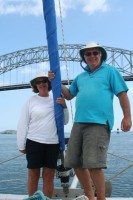
Who: Michael & Jackie Chapman
Port: Falmouth

